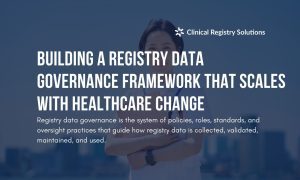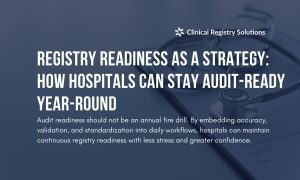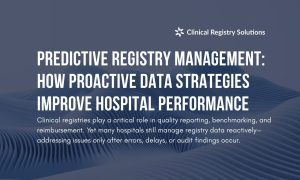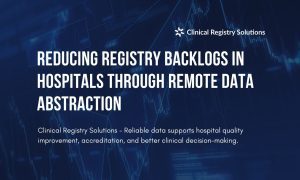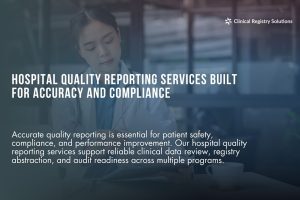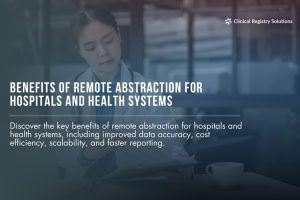In today’s healthcare landscape, sustaining clinical data is more important than ever. Proper management of patient information enables doctors, hospitals, and researchers to make informed decisions that enhance patient care services and improve outcomes.
Clinical Data Management Solutions play a vital role in managing and tracking treatment phases and monitoring patient progress, ensuring patients receive the best possible care. These systems not only identify errors, delays, and inefficiencies but also help healthcare providers continuously improve their workflows—resulting in greater efficiency and better patient outcomes.
In this blog, we explore what clinical data management is, why it’s critical for patient outcomes, and how hospitals benefit from leveraging remote data abstractors and core measures abstraction services.
What Is Clinical Data Management?
Clinical data management involves the systematic collection, organization, and analysis of patient information—including medical histories, treatment plans, pathology reports, and test results. When done effectively, hospitals are better positioned to deliver improved patient outcomes by basing care decisions on accurate, up-to-date information.
Why Is Clinical Data Management Important?
- Keeps patient records accurate and current
- Enables physicians to provide better treatment plans
- Facilitates hospital operations and reduces errors
- Supports medical research and advances in healthcare
- Ensures compliance with healthcare laws and regulations
How Clinical Data Management Enhances Patient Care and Outcomes
Accurate Diagnosis and Treatment
Well-organized data management allows doctors to quickly access a patient’s history and medical records—helping them make precise diagnoses and develop effective treatment plans. With comprehensive data at their fingertips, healthcare professionals avoid redundant tests and reduce the risk of medication errors or adverse drug interactions.
Mitigating Medical Errors
Medical errors often result from incomplete or inaccurate records. Core measures abstraction helps hospitals monitor key quality indicators, improving patient safety and reducing complications. Proper documentation of allergies, past surgeries, and medications prevents harmful mistakes.
Increased Efficiency in Decision-Making
Complete and accurate patient data accelerates clinical decision-making—crucial in emergencies like heart attacks or strokes where every second counts. Real-time data access empowers medical teams to respond swiftly and appropriately.
Improved Patient Follow-Up
For chronic conditions like hypertension, diabetes, and heart disease, routine monitoring is vital. Clinical data management enables healthcare providers to track treatment progress and adjust care plans accordingly. Remote monitoring technologies further enhance this by allowing continuous oversight without requiring frequent hospital visits.
Ensuring Compliance with Healthcare Protocols
Hospitals must meet specific regulatory criteria to maintain accreditation and funding. Remote data abstractors play a key role in consolidating patient information and producing reports necessary for compliance, protecting institutions from penalties and strengthening their reputations.
The Role of Remote Data Abstractors
Who are Remote Data Abstractors?
They are skilled professionals who collect and edit medical data remotely, assisting hospitals that lack the resources for full-time in-house data specialists. This approach helps healthcare providers meet data collection deadlines while reducing the workload on clinical staff.
Advantages of Remote Data Abstractors
- Reduce workload for hospital personnel
- Increase data accuracy
- Save time and lower operational costs
- Assist with regulatory compliance
- Improve overall hospital efficiency
In today’s environment of staffing shortages, remote abstractors provide an elegant, cost-effective solution that lets doctors focus on patient care.
What Is Core Measures Abstraction and Why Is It Important?
Core measures abstraction focuses on collecting and evaluating key metrics related to the quality of care hospitals provide. These data points help institutions:
- Refine treatment protocols
- Decrease hospital readmissions
- Meet national healthcare performance goals
- Inform legislative policies and healthcare standards
Overcoming Clinical Data Management Challenges
Common Challenges and Solutions:
| Challenge | Solution |
| Inaccurate Data | Implement systems with validation and verification to audit data accuracy |
| Overworked Medical Staff | Employ freelance or remote data abstractors to ease workload |
| Compliance Issues | Use data tracking software and follow established protocols to meet legal standards |
| Data Security Concerns | Invest in cybersecurity measures, staff training, and strong encryption for patient privacy |
How Hospitals Can Better Manage Clinical Data
- Use automated data collection tools to reduce manual errors
- Provide staff training on proper data management practices
- Outsource to remote data abstractors for scalable support
- Track performance indicators to identify areas for improvement
- Conduct regular audits to ensure data is current and compliant
Conclusion
Effective Clinical Data Management Solutions are essential for improving patient outcomes and hospital efficiency. Accurate data reduces medical errors, supports regulatory compliance, and enhances decision-making—ultimately leading to better care for patients.
Healthcare providers who invest in robust data management systems and leverage remote abstractors can maintain high-quality patient care without sacrificing operational efficiency. Building a strong clinical data framework benefits patients, clinicians, and healthcare institutions alike.
